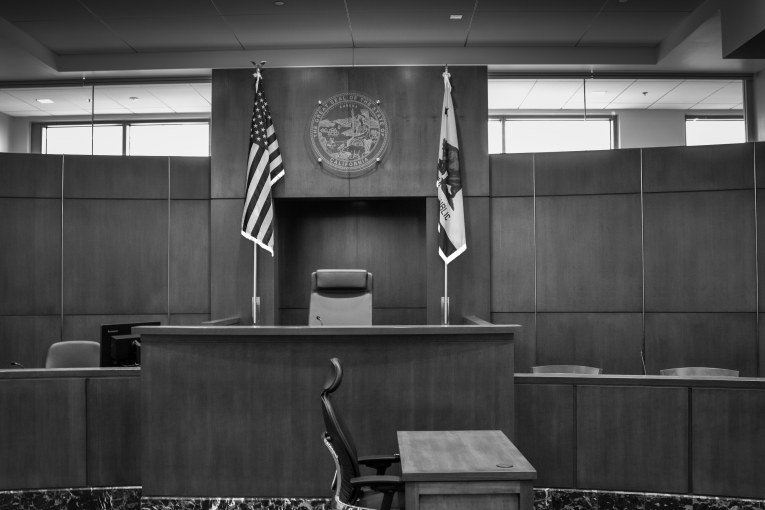
 by Jade Wolansky
by Jade Wolansky
Defense Attorney Robert Spangler filed a motion to suppress evidence obtained by the Yolo County Sheriff’s Office in the case of Corina Esparza. She was arrested for possession of suspected methamphetamine and drug paraphernalia.
On December 8, 2015, at around 7:20pm, Sheriff’s Deputy Nick Morford and Sergeant Hector Bautista were dispatched to investigate several suspicious motor homes parked at a Motel 6. The Motel 6 manager informed Dep. Morford and Sgt. Bautista that two of the motor homes were illegally parked. At one of the vehicles, Morford and Bautista observed and detained the defendant and another individual. During detainment, Morford and Bautista located a smoking pipe and a clear plastic baggie containing suspected methamphetamine.
In the People’s opposition to the defendant’s motion to suppress evidence, Deputy District Attorney Shelby Doyle argued that Sgt. Bautista’s initial contact with the defendant did not constitute a detention and that the defendant provided voluntary consent. Voluntary consent permits an officer to search without a warrant.
The prosecution cited People v. Banks (1990) and People v. Gonzalez (1960) that a person is not detained if a policeman approaches an individual in a public space and asks if the person is willing to answer questions. As defined in People v. Brown (2015), if a person voluntarily answers, those responses are admissible in a criminal prosecution. According to the prosecution’s statement of facts, Sergeant Bautista approached the vehicle and identified himself. He did not make any commands, he did not open a door to the vehicle, he did not try to enter the vehicle, he did not display any weapons, nor did he indicate to the defendant and the other individual that they were not free to leave.
Allegedly, Deputy Morford specifically asked the defendant if he could retrieve her bag to obtain her ID. The defendant replied, “Yes.” Therefore, entry into the vehicle was consensual. According to the prosecution, the defendant also gave implied consent when the defendant opened the east door of the motor home.
Moreover, the prosecution argued that officers may enter the motor home even without consent. In Arizona v. Grant (2009), police may search a vehicle if “is it reasonable to believe the vehicle contains evidence of the offense of arrest.”
The defense filed the motion to suppress because they believe the defendant’s search and seizure to have been unlawful. First, they stated that the defendant had a legitimate expectation of privacy. As defined in Rakas v. Illinois (1978), a legitimate expectation can challenge a police search.
In addition, the defense argued that consent to search and seizure must be “freely and voluntarily given” as defined in Chimel v. California (1969) and People v. James (1977). The defense cited People v. Michael (1955) to state that a defendant does not need to “forcibly resist to an officer’s assertion of authority to search his person” in order to protect their right to an unreasonable search and seizure. According to the defense, the officers did not request permission to search the vehicle nor the contents of the black bag, and said that the statements in Deputy Morford’s report that there were requests for consent are false. Allegedly, after being ordered to exit the motor home, the defendant complied. Once the defendant left, one of the officers entered the motor home and picked up a black bag. Subsequently, the officer asked if the defendant’s ID was in the bag. The defendant replied that it might be but that it might also be on the bed. An audio recording of dialogue with the defendant detailed the defendant’s outrage.
The defense also argued that the detention was without reasonable suspicion. According to the defense, Deputy Morford and Sergeant Bautista did not have reasonable suspicion that the defendant was engaged in criminal activity, nor that such activity had previously taken place or was about to take place. No one had asked or demanded the defendant leave the premises of the Motel 6, thus she was not in violation of Penal Code section 602, which charges individuals with criminal trespassing.
The prosecution countered that the officers nonetheless had the right to enter the vehicle and retrieve the defendant’s ID due to safety concerns. The officers had safety concerns due to the defendant’s reluctance to respond to the officers verbal commands. Allegedly, the defendant hid on the ground and ignored Sergeant Bautista’s attempts at verbal contact. This behavior suggested to the officers that the defendant might be in possession of a weapon.
In the prosecution’s final argument, as defined in People v. Kraft (2000), a warrantless custodial arrest is reasonable if there is probable cause for investigating a criminal offense. Deputy Morford had probable cause to believe the defendant had committed a criminal offense. Firstly, because the officers had received a call about suspected criminal trespassing. Secondly, when the officers found drug paraphernalia and suspected methamphetamine.
If the prosecution cannot provide justification for or an exception to the officers’ violation of the defendant’s Fourth Amendment rights regarding searches and seizures, the court is required to suppress any evidence obtained during search and seizure. According to the fruit-of-the-poisonous-tree doctrine, evidence (or “fruit”) obtained from an illegal search or arrest (the “poisonous tree”) is tainted and therefore inadmissible. This includes primary and secondary, or derivative, evidence obtained by police. Derivative evidence includes further facts, information, or physical objects that were obtained from the illegal search.
smells fishy….
Marina wrote:
> smells fishy….
If they were meth heads the cops probably smelled something other than fish…
http://pull01.wizardworld.netdna-cdn.com/media/catalog/product/b/b/bbrv.jpg
was there any evidence of any smells? did neighbors complain? and so on….what was the real reason for the invasion of privacy?
of course, Soda….likely you are on the side of the cops…perhaps you haven’t had any real life experiences yet to disabuse you of the idea that cops are in it for anything but themselves….oh wait, that was a generality…should I say many cops, or perhaps some?????